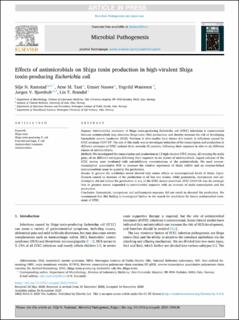| dc.contributor.author | Ramstad, Silje Nøstvedt | |
| dc.contributor.author | Taxt, Arne Michael | |
| dc.contributor.author | Naseer, Mohammed Umaer | |
| dc.contributor.author | Wasteson, Yngvild | |
| dc.contributor.author | Bjørnholt, Jørgen Vildershøj | |
| dc.contributor.author | Brandal, Lin Cathrine T. | |
| dc.date.accessioned | 2021-05-26T13:37:27Z | |
| dc.date.available | 2021-05-26T13:37:27Z | |
| dc.date.created | 2020-12-14T15:05:33Z | |
| dc.date.issued | 2020 | |
| dc.identifier.citation | Microbial Pathogenesis. 2020, 1-7. | en_US |
| dc.identifier.issn | 0882-4010 | |
| dc.identifier.uri | https://hdl.handle.net/11250/2756491 | |
| dc.description.abstract | Purpose: Antimicrobial treatment of Shiga toxin-producing Escherichia coli (STEC) infections is controversial because antimicrobials may stimulate Shiga toxin (Stx) production, and thereby increase the risk of developing haemolytic uremic syndrome (HUS). Previous in vitro studies have shown this mainly in infections caused by STEC serotype O157:H7. The aim of this study was to investigate induction of Stx transcription and production in different serotypes of STEC isolated from severely ill patients, following their exposure in vitro to six different classes of antimicrobials. Methods: We investigated Stx transcription and production in 12 high-virulent STEC strains, all carrying the stx2a gene, of six different serotypes following their exposure to six classes of antimicrobials. Liquid cultures of the STEC strains were incubated with sub-inhibitory concentrations of the antimicrobials. We used reversetranscription quantitative PCR to measure the relative expression of Stx2a mRNA and an enzyme-linked immunosorbent assay to quantify Stx production. Results: In general the antibiotics tested showed only minor effects on transcriptional levels of Stx2a. Ciprofloxacin caused an increase of Stx production in all but two strains, while gentamicin, meropenem and azithromycin did not induce Stx production in any of the STEC strains examined. STEC O104:H4 was the serotype that in greatest extent responded to antimicrobial exposure with an increase of stx2a transcription and Stx production. Conclusion: Gentamicin, meropenem and azithromycin exposure did not result in elevated Stx production. We recommend that this finding is investigated further in the search for candidates for future antimicrobial treatment of STEC. | en_US |
| dc.language.iso | eng | en_US |
| dc.rights | Navngivelse 4.0 Internasjonal | * |
| dc.rights.uri | http://creativecommons.org/licenses/by/4.0/deed.no | * |
| dc.title | Effects of antimicrobials on Shiga toxin production in high-virulent Shiga toxin-producing Escherichia coli | en_US |
| dc.type | Peer reviewed | en_US |
| dc.type | Journal article | en_US |
| dc.description.version | publishedVersion | en_US |
| dc.source.pagenumber | 1-7 | en_US |
| dc.source.journal | Microbial Pathogenesis | en_US |
| dc.identifier.doi | 10.1016/j.micpath.2020.104636 | |
| dc.identifier.cristin | 1859623 | |
| dc.relation.project | Helse Sør-Øst RHF: 2017036 | en_US |
| cristin.ispublished | false | |
| cristin.fulltext | original | |
| cristin.qualitycode | 1 | |

